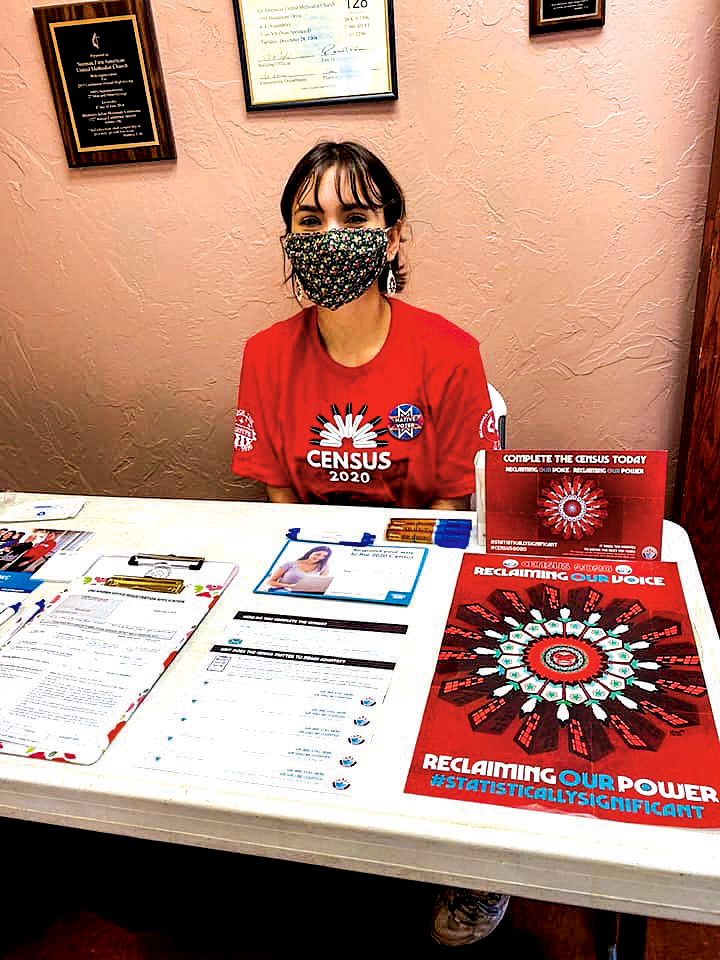 Rock The Native Vote 2020 set up census support stands, including this one at Norman First American United Methodist Church in Oklahoma. Photo courtesy Rock The Native Vote
Rock The Native Vote 2020 set up census support stands, including this one at Norman First American United Methodist Church in Oklahoma. Photo courtesy Rock The Native VoteIndian Country census woes mount
NORMAN, Oklahoma — After an August federal directive to shorten the 2020 Census outreach period jarred the nation, Indian organizations redoubled efforts to make sure constituents are counted in the decennial population survey that has been handicapped by the Covid-19 pandemic crisis, especially in Native communities.
On August 3, U.S. Census Bureau Director Steven Dillingham announced the decision to end the census’ national field response operation one month earlier than the October 31 deadline. His agency previously had asked Congress to extend the period until 2021 due to difficulties arising from mobilization during the coronavirus pandemic.
The first-ever Urban Indian Civic Engagement Project, funded by the National Urban Indian Family Coalition and its partners, responded to the latest of several census schedule adjustments, saying, “Let’s be clear of what’s at stake for American Indian and Alaska Natives: An undercount could lead to losing as much as $1 billion per year nationally in resources that our Native communities rely on for healthcare, schools, roads, and other essential programs and services.”
Tell Congress to demand the @uscensusbureau not end the #Census one month early: https://t.co/fgOgRbWomj
Don’t let them undercount Native American families
#IndianCountryCounts#IAmNativeAndICount pic.twitter.com/T6ajqLuWWB— Native Organizers Alliance (@NativeOrganizer) September 5, 2020
The advocacy groups are sponsoring a petition, urging constituents to contact their federal elected officials with a demand to “oppose this obvious tactic to steal resources our communities need,” Rock The Native Vote 2020 said. The organization set up census support stands in Norman and other places.
“This is a deliberate act to try to draw resources away from American Indians, Alaska Natives, and other hard-hit communities of color, while we’re focused on responding to and recovering from the pandemic,” it said. “We will not be erased. We will be visible, and we will be heard.”
American Indians and Alaska Natives were the most undercounted population group in the 2010 census at 4.9%, more than twice the rate of the next undercounted group. In 1990, the undercount was even more dismal at 12%. In the 2020 edition of the survey, the field operation was launched late on some reservations due to lockdowns and other pandemic related complications.
By the end of August, a sampling of Northern Great Plains reservations’ household response rates, conducted by the Native Sun News Today, revealed the following approximate percentages of completed returns: Ft. Belknap, Pine Ridge, and Rosebud at 20 percent; Ft. Berthold at 22; Blackfeet, Cheyenne River and Crow Creek at 25; Ft. Peck at 33; Standing Rock at 35; Lake Traverse at 40; Yankton at 42; Flandreau and Wind River at 50.
This compared with the national rate of nearly 65 percent of households responding, via internet, telephone or postal service. Given the contrast, petition promoters proclaimed, “The decision to shorten the census timeline is an attack on Indian country. Contact your legislators and make noise on social media to demand that the U.S. Census Bureau give communities enough time to be counted,” they said.
Natalie Landreth, senior staff attorney at the Native American Rights Fund joined the battle cry, saying that the reduced field operation time for census workers to follow up on this year’s novel self-reporting period, “ensures a historic, devastating undercount for Native Americans. We’re not guessing. We’ve run all the numbers, and we know it,” she said.
Director Dillingham did not explain the reason for the schedule change. Four days later his agency and the Centers for Disease Control, or CDC, released a joint statement to the effect that, “Participation in 2020 Census interviews should present a low risk of transmission of Covid-19.” Census takers are trained to rigorously and universally follow CDC recommendations to mitigate risk of transmission.
The @uscensusbureau announced that it is ending #Census2020 field operations on September 30, 2020. NCAI, @NDNrights and @UrbanIndianNews are deeply alarmed and concerned with this unwarranted and irresponsible decision. Read our join statement: https://t.co/x60QGcL4JM pic.twitter.com/Eb64Tq6Aws
— National Congress of American Indians (@NCAI1944) August 5, 2020
In June, Sen. Martin Heinrich (D-N.M.) called on the CDC to share coronavirus data with the nation’s 12 Tribal Epidemiology Centers, warning that its refusal was hampering Native Americans’ ability to respond to the pandemic.
“By not allowing Native communities access to this data, your agency is playing a role in widening the health disparities that are already running rampant in areas that are ill-equipped to contain the spread and the outcomes of this pandemic,” he wrote in a letter to Director Robert R. Redfield.
NATIVE SUN NEWS
TODAY
Support Native media!
Read the rest of the story on Native Sun News Today: Indian country census woes mount
Contact Talli Nauman at talli.nauman@gmail.com
Content © Native Sun News Today
Native America Calling: Native skin cancer study prompts new concerns about risk
South Dakota Searchlight: Trump terminations hit Indian Arts and Crafts Board
Native America Calling: Regional improvement in suicide statistics is hopeful sign
List of Indian Country leases marked for termination by DOGE
‘Let’s get ’em all done’: Senate committee moves quickly on Indian Country legislation
AUDIO: Senate Committee on Indian Affairs Business Meeting to consider several bills
VIDEO: Senate Committee on Indian Affairs Business Meeting to consider several bills
Native America Calling: The ongoing push for MMIP action and awareness
‘Blindsided’: Indian Country takes another hit in government efficiency push
Native America Calling: A new wave of resistance against Trans Native relatives
Urban Indian health leaders attend President Trump’s first address to Congress
‘Mr. Secretary, Why are you silent?’: Interior Department cuts impact Indian Country
Cronkite News: Two Spirit Powwow brings community together for celebration
Native America Calling: Native shows and Native content to watch
More Headlines
